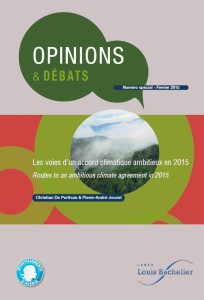 Opinions and Debates (Labex Louis Bachelier) – Special Issue – February 2015
Opinions and Debates (Labex Louis Bachelier) – Special Issue – February 2015
« Routes to an ambitious climate agreement in 2015 »
by Christian de Perthuis and Pierre-André Jouvet
Preface by Jean Jouzel:
The first IPCC Assessment Report came out twenty-five years ago. It was one of the first syntheses of the work of climate scientists on climate change. It sounded the alarm: without concerted action to curb global emissions of greenhouse gases, the world would be taking a very risky path in terms of climate.
Since 1990, our knowledge of the climate system and of the disruption caused by the accumulation of anthropogenic greenhouse gas has been refined. Paleoclimatology has helped us learn from the past. The development of simulation models has specified the conditions required to avoid the risk of average warming above 2°C.
The conclusions of the 5th IPCC Assessment Report are in this regard very eloquent: since the beginning of the last century, humanity has emitted two-thirds of the carbon budget that would be required to limit the risk of warming to no more than 2°C. At current rates, this budget will be totally exhausted in just 30 years. In other words, tomorrow!
The major challenge of the Paris climate conference in December is to build an international agreement, the overriding ambition of which must be a rapid shift in the emissions trajectory.
To achieve this, it is essential to overcome the obstacles and sterile confrontations seen in the past, and to find the right economic incentives, giving visibility over the medium and long term.
The work carried out by the Climate Economics Chair has from the outset been situated within this perspective. It therefore gives me great pleasure to write the preface to this contribution by Christian de Perthuis and Pierre-André Jouvet. They provide an uncompromising account of the evolution of international climate negotiations and offer valuable guidelines for the success of the next climate summit in Paris.
